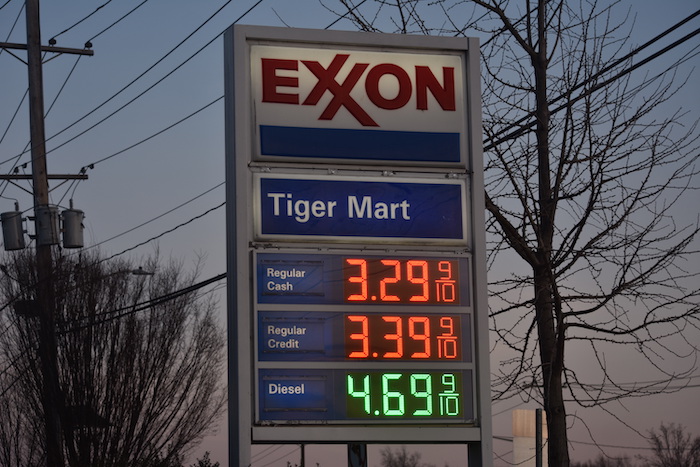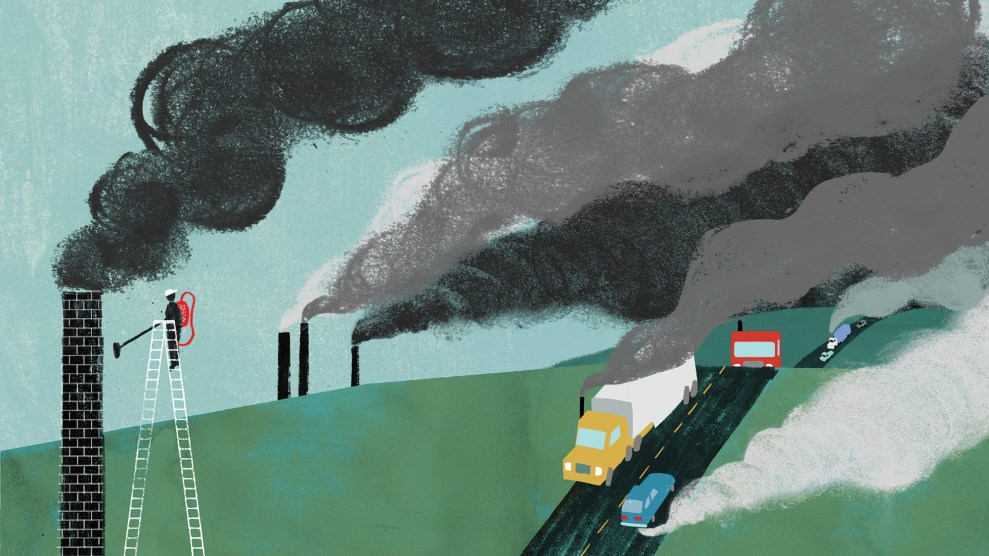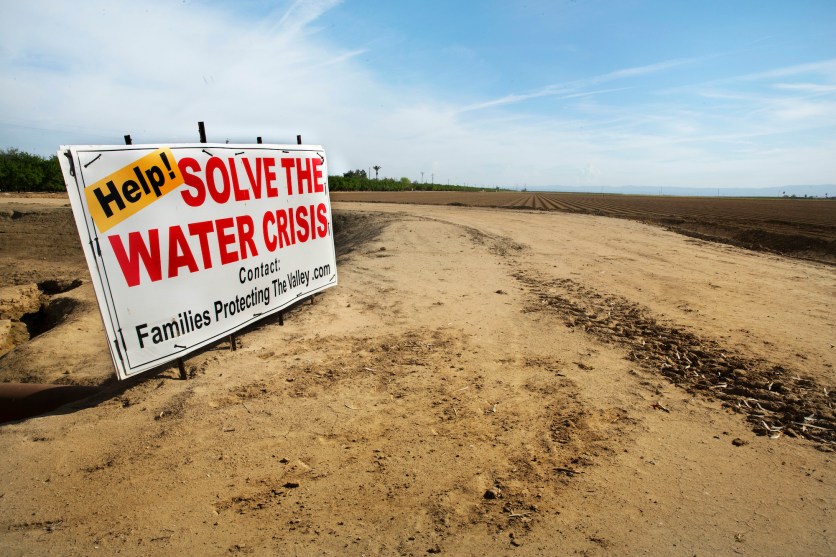
Bayne Stanley/Zuma
This story was originally published by the Guardian and is reproduced here as part of the Climate Desk collaboration.
Some of the world’s most profitable—and most polluting corporations—have invested in carbon offset projects that have fundamental failings and are “probably junk,” suggesting industry claims about greenhouse gas reductions were likely overblown, according to new analysis.
Delta, Gucci, Volkswagen, ExxonMobil, Disney, easyJet and Nestlé are among the major corporations to have purchased millions of carbon credits from climate friendly projects that are “likely junk” or worthless when it comes to offsetting their greenhouse gas emissions, according to a classification system developed by Corporate Accountability, a nonprofit, transnational corporate watchdog.
Some of these companies no longer use CO2 offsets amid mounting evidence that carbon trading does not lead to the claimed emissions cuts—and in some cases may even cause environmental and social harms.
However, the multibillion-dollar voluntary carbon trading industry is still championed by many corporations including oil and gas majors, airlines, automakers, tourism, fast-food and beverage brands, fashion houses, banks and tech firms as the bedrock of climate action—a way of claiming to reduce their greenhouse gas footprint while continuing to rely on fossil fuels and unsustainable supply chains.
“These findings add to the mounting evidence that peels back the greenwashed facade of the voluntary carbon market.”
Yet, for 33 of the top 50 corporate buyers, more than a third of their entire offsets portfolio is “likely junk”—suggesting at least some claims about carbon neutrality and emission reductions have been exaggerated according to the analysis. The fundamental failings leading to a “likely junk” ranking include whether emissions cuts would have happened anyway, as is often the case with large hydroelectric dams, or if the emissions were just shifted elsewhere, a common issue in forestry offset projects.
“These findings add to the mounting evidence that peels back the greenwashed facade of the voluntary carbon market and lays bare the ways it dangerously distracts from the real, lasting action the world’s largest corporations and polluters need to be taking,” said Rachel Rose Jackson, Corporate Accountability’s director of research.
The fossil fuel industry is by far the largest investor in the world’s most popular 50 CO2 offsetting schemes. At least 43 percent of the 81 million CO2 credits purchased by the oil and gas majors are for projects that have at least one fundamental flaw and are “probably junk,” according to the analysis.
The transport industry, which accounts for about a fifth of all global planet-warming emissions, has also relied heavily on carbon offsetting projects to meet climate goals. Just over 42 percent of the total credits (55 million) purchased by airlines and 38 percent purchased by automakers (21 million) for the top 50 projects are likely worthless at reducing emissions, the analysis found.
The top 50 projects include forestry schemes, hydroelectric dams, solar and wind farms, waste disposal, and greener household appliances schemes across 20 (mostly) developing countries, according to data from AlliedOffsets, the most comprehensive emissions trading database, which tracks projects from inception. They account for almost a third of the entire global voluntary carbon market (VCM), suggesting that junk or overvalued carbon credits that exaggerate emission reduction benefits could be the norm.
The VCM industry works by carbon credits being tradable “allowances” or certificates that allows the purchaser to offset 1 ton of carbon dioxide or the equivalent in greenhouse gasses by investing in environmental projects anywhere in the world that claim to reduce carbon emissions.
Climate experts say that the carbon trading market has failed to produce the promised planetary benefits, delayed the transition away from oil, gas, and coal, and caused harm to forests and communities in developing countries where most offset projects are located.
On Tuesday, the Biden administration published new guidelines on responsible participation in VCMs which they say will drive credible and ambitious climate action. But critics argue that offsets are fundamentally flawed.
“Overall, carbon offsets are, according to most expert analyses, neither credible nor scalable to the urgency and scale of the carbon dioxide problem,” said Richard Heede, co-director of the Climate Accountability Institute, a nonprofit research and education group.
“This report documents the prevalence of ‘worthless’ or ‘likely junk’ carbon offsets in the global Voluntary Carbon Market, and undermines the corporate rationale for claiming emissions reductions based on such credits,” Heede added.
The new sector-by-sector analysis found:
Fossil fuel firms and airlines
Oil and gas majors are among the largest corporate buyers of likely junk offsets. Almost half (49 percent) the 3.7 million carbon credits purchased by ExxonMobil are for two projects classified as likely junk or worthless. Internal company documents show that scientists at ExxonMobil, which is one of the world’s worst greenhouse gas emitters, were accurately predicting the impact of fossil fuels on the climate in the 1970s.
A spokesperson for ExxonMobil said: “Carbon offsets are a viable way to [reduce emissions and reach net zero], which is why we continue to evaluate them. We’re working to verify the claims cited in this analysis.”

With the exception of fossil fuel firms, Delta has purchased more carbon credits than any other corporation. Just over 35 percent of the 41 million carbon credits purchased by Delta were from 11 offset projects which are likely worthless or junk, according to Corporate Accountability.
In California, a 2023 civil class-action alleged that Delta misrepresented itself as carbon-neutral as the company’s reliance on the carbon trading market renders its climate friendly representations as false and misleading. The judge reduced the scope of the lawsuit last month after Delta rejected the allegations and filed a motion to dismiss. The case continues.
A spokesperson said the company is investing in sustainable aviation fuel, more fuel-efficient aircraft and reducing fuel use through operational efficiencies in a bid to reach “net zero” by 2050. “We have shifted away from carbon neutrality and offsets.”
Meanwhile almost 72 percent of the 11 million carbon credits ever purchased by easyJet, a popular low-cost European airline, were for projects classified as likely junk. In 2022, the airline announced plans to transition away from offsetting in favor of a “roadmap to net zero” emissions by 2050 through more fuel-efficient aircraft and perational efficiencies as well as sustainable aviation fuel and carbon capture and storage—technologies which scientists have warned could exacerbate the climate crisis.
An easyJet spokesperson said: “In the short period we did offset customer emissions, we had robust due diligence processes in place, with all projects recommended by expert partners and all required to meet the highest standards available.”
A 2021 joint investigation by the Guardian revealed that major airlines including Delta and easyJet were using unreliable “phantom” carbon credits to claim their flights were carbon neutral.
Car makers, entertainment giants, luxury goods
Almost half (46 percent) of the 11 million CO2 credits purchased by Volkswagen from the top 50 projects were likely junk, according to the analysis. The German carmaker recently announced a joint venture to develop its own carbon credit projects and said they increasingly rely on on-site inspections, due diligence and audit processes to verify projects. VW aims to reduce its emissions by 90 percent compared to 2018 by converting its energy supply and increasing energy efficiency among other measures.
37 percent of the industry-wide credits purchased from projects classified as likely junk.
In the world of entertainment, almost 62 percent of the 5.8 million carbon credits retired by Disney are from two offset projects which have been classified as likely junk or worthless.
The analysis also found that 75 percent of the 4.4 million carbon credits purchased by the Italian luxury fashion house Gucci have been for projects classified as likely junk. Gucci, which was once a high-profile proponent of offsetting, last year dropped its carbon neutral claim amid growing evidence that the rainforest projects it relied on were likely junk and potentially harmful. Gucci is finalizing new climate commitments with a greater focus on cutting absolute emissions through its supply chain.
The food and drinks industry is a major climate polluter—and investor in carbon markets, with 37 percent of the industry-wide credits purchased from projects classified as likely junk.
Food and drink industry
The analysis found that almost 36 percent of the 2.2 million carbon credits purchased by Nestlé, the world’s largest food and beverage company, were from five offset projects which have been classified as likely junk. Nestlé said that it stopped purchasing credits from these projects in 2021/2022. “Reaching net zero emissions at Nestlé does not involve using offsetting: we focus on GHG emissions reductions and removals within our value chain to reach our net zero ambition.”
While some corporations have signaled a shift away from carbon offsetting, the VCM is still valued between $2 and $3 billion—despite warnings that the industry is a false solution delaying the world’s transition away from oil, gas and coal.
“This research once again shows that big corporate polluters claiming climate credentials are the main buyers of junk credits. But racking up carbon credits doesn’t make you a climate leader. Cutting fossil fuels does. We can’t offset our way to a safe climate future,” said Erika Lennon, senior attorney at the Centre for International Environmental Law (Ciel).
“For all the talk about carbon credits accelerating climate action, they are actually greenwashing climate destruction.”

















